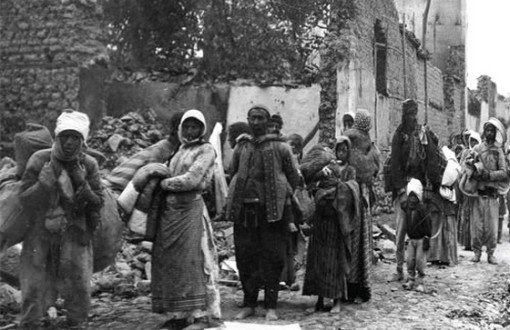“What Was the Fault of the Poor Armenian Nation...”

The material was provided by Anahit Berberyan
My Grandmother Arshaluys Berberyan (Sarajyan) Hovhannes was born in Van in 1898, lived in Tehran and died in Yerevan in 1978. She collected her reminiscences in two big notebooks and called them “On the Edge of My Life”.
I cite passages from her notebook.
“On July 15, 1915 we, the inhabitants of Van, left our birthplace and our native country, our homes and houses, the sweet air and water, turned into a toy in the hands of destiny, set off on the black road of exile and went from country to country like tramps; like a storm-hit ship we were smashed upon one rock then another and, in the end, the broken ship took us to some unknown, alien shores.
Every time I remember my birthplace Van I can feel some kind of murmur in the deepest part of my heart as if cold water were poured on hot fire, and I remember my happy days with so much pity.
We set out and left behind our dearest Lake Van that wept, sobbed like an abandoned orphan and called us as if saying “take me with you, I won’t stay without you, but how can I stay without you…”
We had heard so much about the hell with its awful sides in tales, but who could imagine that one day we were to see inferno with our own eyes and were to feel on our own skin hell in its full depth, unspeakable torture and sufferings. I thought they say the hell was only for those evil and sinful; then what was this poor Armenian nation guilty in to live those black and severe days.
Among all that fuss and rush I lost my Mother and sisters but kept walking with others. We reached Berkry. We were going by a narrow path through the mountains. Suddenly we heard shoots. The terrific enemy had come down the mountain, cut the passage of the caravan and had started to massacre ruthlessly, to kidnap young girls. The crowd was screaming in panic, tearing hair. At that wild moment I had a glance of the river flowing below and, oh, what is that… Hundreds of bodies are rolling in the river and floating away. Armenian women, Armenian young girls, keeping tight to honor and pride preferred to be swallowed by the waves of the river than get into the hands of the vile and lawless enemy.
We were mad of awfulness; we were running horrified and breathless and we didn’t know where. We went on for five or six days hungry and exhausted. Mothers hopelessly left their children on the road but volunteers followed them in carts, collected everybody, put into carts and again followed the people.
My feet hurt and were swollen like logs; I could no longer walk. The crowd came and passed by. Tears of thousands like me reached the sky. What should I do? I was sitting beside the road crying hopelessly and bitterly and was looking at my sick feet thinking about my desperate situation when suddenly I heard some ringing and saw a caravan. I was scared to see Muslims but one of them brought his camel near, the clever animal kneeled and I got on it. I kept tight to the camel and with two arms held the unknown woman in front of me by her waist, who turned round and said, “Don’t fear, balés [bales means my baby, tr.]”. She had lost her own children among the refugees. The caravan of camels kept going ringing the bells and taking so many helpless. We had already covered quite a long distance when a cameleer said something to another, who took some bread out of a bundle and handed to us.
I was so touched by the honesty of that stranger that forgot about the awful pain of my feet and thought anyone had that “voice of consciousness” whether Christian or Muslim. It is only ignorance that has ruled the humanity for centuries and has now become the cause of this huge and terrific disaster…”
The caravan brought that woman and my Grandmother to the crowd of refugees. After long wanderings and sufferings Grandmother was able to find her relatives. They had a narrow escape and in the end came to Yerevan.
* Under the headline "100 years... Real Stories" Information, Analytical Agency "Armedia" presents real stories from the lives of the Genocide survivors (the stories are told by the survivors’ descendants, relatives, close people) collated by "European Integration" Non-Governmental Organization within the project "The Turk Who Saved My Life". The stories are special as the hero/heroes fled the claws of the Great Genocide through the direct or indirect assistance of a Turk/Turks (a neighbor, well-wisher, friend or witness of the event). The project is implemented with the assistance of the United Kingdom Foreign and Commonwealth Office. The presented materials, opinions and conclusions introduce the views of the authors and participants and do not reflect the position of the United Kingdom Government.
* Click here to read the article in Turkish.
Other pieces in the series:
* Aris Nalcı talks about "The Turk Who Saved Me" Project: Story Project Aims to Face the Genocide Without Prejudice
* “A Fragment from My Grandmother’s Nostalgia Remained in Us”
* "Run, Go, Keep My Light Burning"
* "My Reminiscences Are Undone Like a Ball of Wool..."
* "Two Offshoot Survivors of Exterminated Dynasties Vowed to Weave Together and Become a Thick Oak"




.jpg)
.jpg)